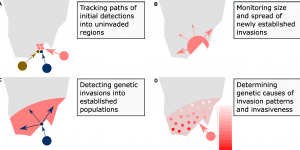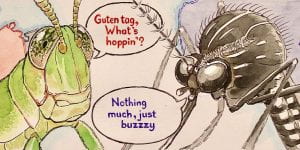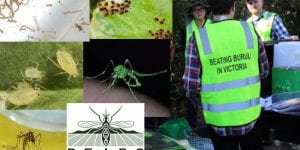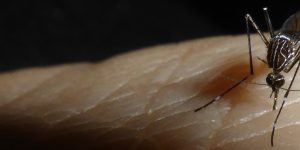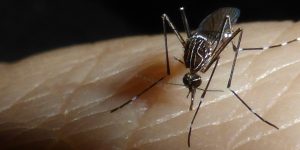Tag: Aedes notoscriptus
-
The breeding trap targeting Melbourne’s growing mozzie problem
Véronique Paris, Liam Ferguson, Nicholas Bell and Ary Hoffmann Banner: Marianne Coquilleau Mosquito-borne diseases like dengue and Japanese encephalitis may feel like far-distant nightmares for many Victorians. Here, the warmer summer months coinciding with the mosquito season are more synonymous with backyard BBQs and backyard cricket than the smell of tropical strength repellents and mosquito […]blogs.unimelb.edu.au/pearg/2024/02/01/the-breeding-trap-targeting-melbournes-growing-mozzie-problem
-
Dengue-blocking mosquitoes here to stay
This article was first published on Pursuit. Read the original article. Dr Perran Stott-Ross Story Producer: Nerissa Hannink Dengue fever and other mosquito-borne diseases remain a massive threat to human health and wellbeing. Urbanisation and climate change are likely to increase this threat as established mosquitoes spread to new environments and gain a foothold. Eradicating […]blogs.unimelb.edu.au/pearg/2022/04/12/dengue-blocking-mosquitoes-here-to-stay
-
Improving mosquito control strategies with population genomics
Words: Tom Schmidt When researchers want to investigate evolutionary processes like adaptation and dispersal, they frequently make use of population genomic methods. Population genomics uses DNA data from across an organism’s entire genome – that is, across all of that organism’s DNA. This DNA data can be compared with DNA from other organisms, which can […]blogs.unimelb.edu.au/pearg/2021/06/28/improving-mosquito-control-strategies-with-population-genomics
-
Sampling by the sea – collecting mosquitoes in the Mornington Peninsula
Words and images: Véronique Paris It’s 7.30 Saturday morning – what are your plans for the day? While you may be still in bed contemplating a coffee, or still sound asleep, I’m packing the PEARG ute with a stack of small buckets, strips of red felt, some rabbit food, and a 20lt jerrycan of water. […] -
MSc projects 2020 – Students wanted
We are seeking motivated MSc students to apply for several projects starting next year. Enquiries via pearg-queries@unimelb.edu.au Project 1/4: Exploring bacterial symbionts for agricultural pest control PEARG is researching ways to control important agricultural pests such as aphids and mites that cause millions of dollars in damage to crops each year in Australia. This project […]blogs.unimelb.edu.au/pearg/2019/06/14/msc-projects-2020-students-wanted
-
SEEKING MSc STUDENT | Buruli Ulcer’s Most Wanted – Understanding the mosquito associated with the flesh-eating bacteria, Mycobacterium ulcerans
Aedes notoscriptus has been identified in association with the emerging bacterial pathogen Mycobacterium ulcerans, which causes Buruli ulcer, as well as being a vector of Ross River virus. Key ecological features such as bloodmeal feeding patterns and movement dynamics of individuals are however not clearly defined. This project will involve both laboratory and field-based components. Field […] -
NEW PROJECT | Buruli ulcer
Words and photo: Jason Axford On 26 April at the Peter Doherty Institute, Federal Minister for Health, Greg Hunt, announced new NHMRC funding to investigate the mysterious and rather horrific disease commonly known as Buruli ulcer (BU) (formerly known as Bairnsdale ulcer). The project is led by Prof. Tim Stinear in the Department of Microbiology […]blogs.unimelb.edu.au/pearg/2018/05/10/new-project-buruli-ulcer


